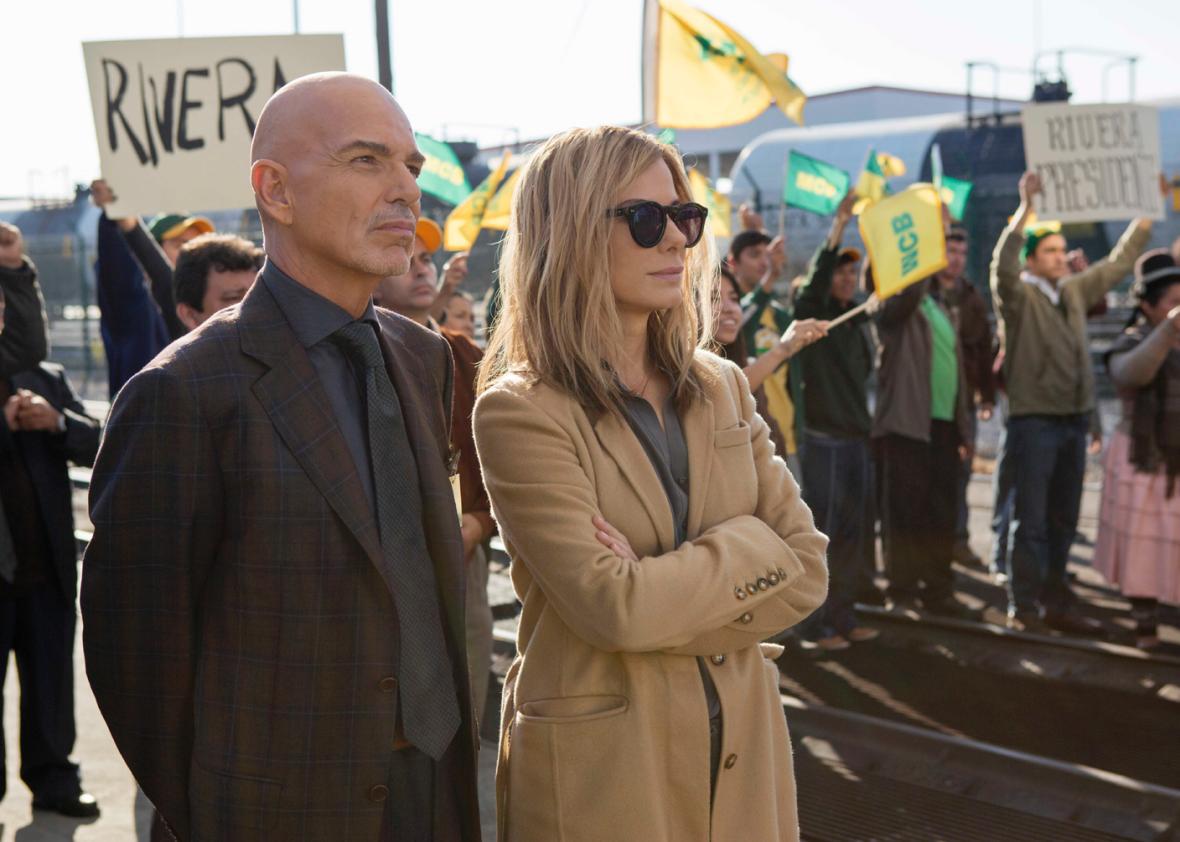If you’ve been following the drama in the House, the inability of most every Republican presidential candidate to lift off, or really any news from American politics over the last 10 or 239 years, you might have noticed that politics is difficult. There are too many balls in the air, too many uncontrollable outside factors, for any singular figure to get all of this under control, be 10 steps ahead of the curve, and successfully and confidently blaze a trail from pre-candidacy to election to dignified leadership. The reality of U.S. politics is dominated not so much by incompetent leaders as mortals who lack the requisite superpowers needed to steer the ship of state.
That’s why Hollywood had to invent a character with such powers: the knowing, salty political consultant. Instead of superhuman strength or projectile spider-webs, this puppet master has in her arsenal a penchant for drinking and smoking, instant access to the perfect quip at the perfect time, and a convenient lack of morality.
It is only the knowing, salty political consultant who can bridge the gap between political reality and tidy fictional narrative. That’s why in a time of ever-greater political chaos, the character rings so false. Maybe it’s time to put it out to pasture.
This Friday, Sandra Bullock assumes the role in Our Brand Is Crisis, a mostly satirical take on a 2005 documentary of the same name about American political consultants’ conquest of a Bolivian election. Bullock plays “Calamity” Jane Bodine, a legendary practitioner of the dark political arts who comes out of semi-retirement to navigate the hapless ex-president back to the top job. Bodine had fled the consulting scene for years after an eruption of conscience that pushed her to mental breakdown, sobriety, and pottery. When she’s recruited for a chance to face off in Bolivia against her longtime and similarly depraved rival, Pat Candy—portrayed convincingly enough as a stock Billy Bob Thornton character by Billy Bob Thornton—she signs up. Soon enough she is smoking, drinking, and scheming again, signaling to the viewer that she’s back to her antiheroic winning ways.
Bodine’s character loosely channels celebrity political consultant James Carville, one of the Americans who worked on the 2002 Bolivian campaign and a consistent fascination of Hollywood. The 2005 Our Brand Is Crisis was the second documentary about Carville’s political work, following 1993’s The War Room, in addition to Carville’s dramatic acting résumé and cable news career. Hollywood loves it some “Ragin’ Cajun,” because he’s the closest real-life approximation to the magical political consultant of its dreams. And even he’s not even that close. Does he drink too much? Smoke too much? Plot out uproarious long-shot tricks against his opponents that always seem to work out even better than hoped? Maybe, kinda. Mostly he is just a funny Southern person who served on a successful presidential campaign; the rest is projected onto him.
Since The War Room, the omnipotent, omniscient celebrity political consultant has been portrayed again and again. Sometimes the portrayal is satirical—Robert DeNiro’s spin doctor in Wag the Dog, the assassin-like Dylan McDermott in The Campaign, the sex-addicted Kathryn Hahn in television’s Parks and Recreation. Sometimes it’s melodramatic—think the sinister Ryan Gosling and Philip Seymour Hoffman in Ides of March, or most notably, Kevin Spacey’s snaky Frank Underwood, the master strategist and politician bundled into one on House of Cards. Sometimes it’s both, as in Kathy Bates’ sharp-tongued, soft-hearted adviser in Primary Colors. The cinematic trope has retroactively kept a light on devilish George H.W. Bush strategist Lee Atwater, who by his own reported deathbed admission was an unholy monster, and to this day keeps afloat the brand of George W. Bush strategist Karl Rove. We’re not supposed to earnestly admire any of these people, but we are supposed to guiltily admire their unfailing ability to guide impossible undertakings, such as the practice of politics, to victory through whatever means.
Bullock’s Jane Bodine offers nothing new. Some of her pranks, specifically one ploy to feed her candidate’s unsuspecting competitor a Nazi quotation during the campaign’s final debate, are good for a laugh. But it seems as though screenwriter Peter Straughan and director David Gordon Green realized near the end that they’d written a feature-length film celebrating consultants’ ability to install a lying, oligarchic, IMF-beholden stooge to a South American presidency, and decided they ought to wrap things up more palatably. So they cop out, closing on an unlikely, feel-good character turn for Bodine.
That’s the problem with focusing a story on the diabolical strategist, the one mythical figure in this godforsaken political system who’s got it all figured out. Either the character repents, and you have a cornball ending, or the character doesn’t, and you have a soapy endorsement of sociopathy.
Can Hollywood find a way to take the political consultant character in a new direction? It already has. Among the many achievements of HBO’s Veep is its discovery of a new, post-Carville political consultant character, one that’s just as cuttingly entertaining but truer to reality. (Vice) President Selina Meyers (Julia Louis-Dreyfus) has a stable of advisers including Dan Egan (Reid Scott) and Jonah Ryan (Timothy Simons) who have internalized and aspire to the Carville cult; it’s just that reality interrupts to remind them that things don’t work like that. There just aren’t enough cigarettes or bottles of Scotch in the world to give any political consultant the power that we, in our fits of frustration, guiltily wish they had.
